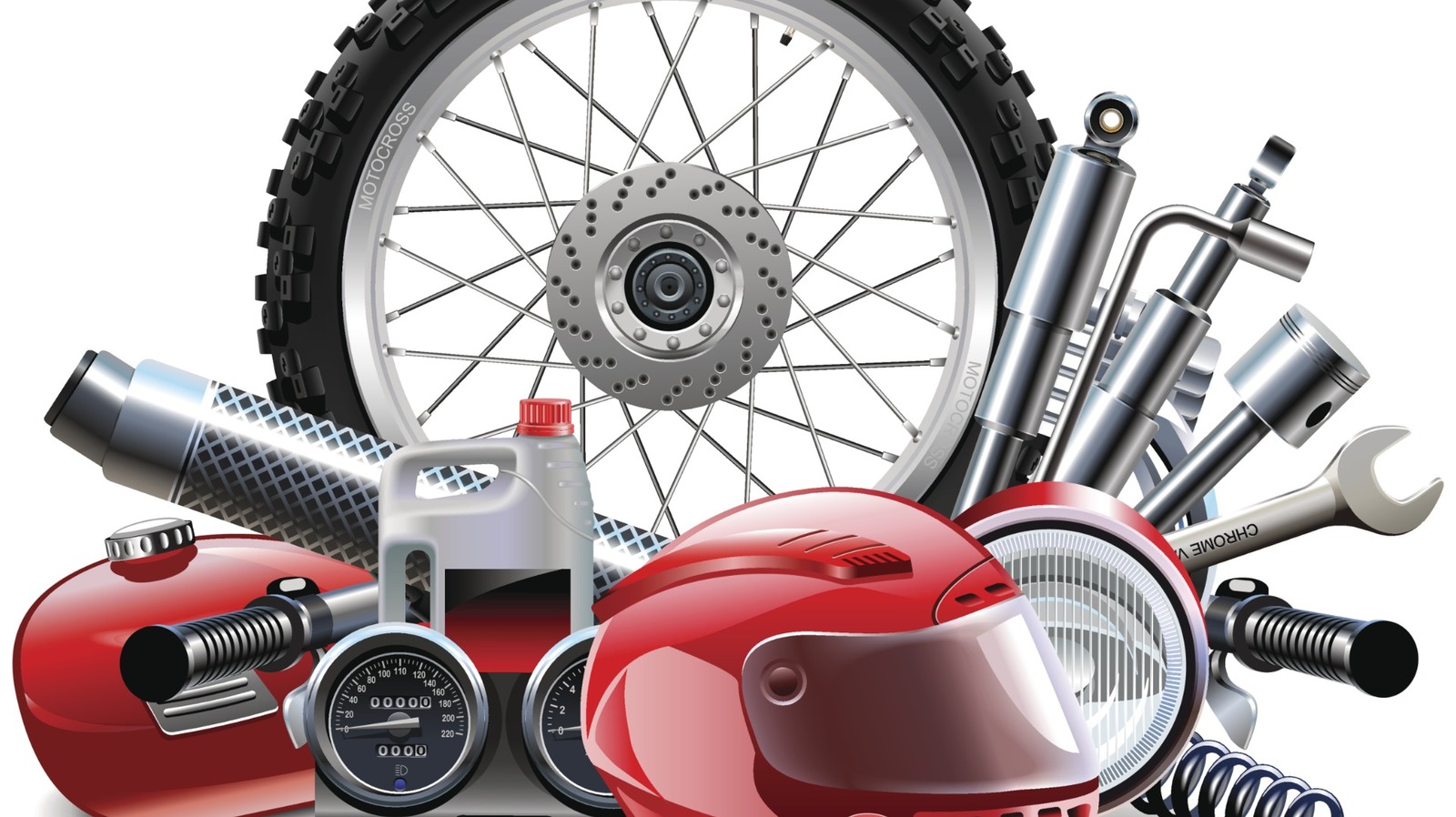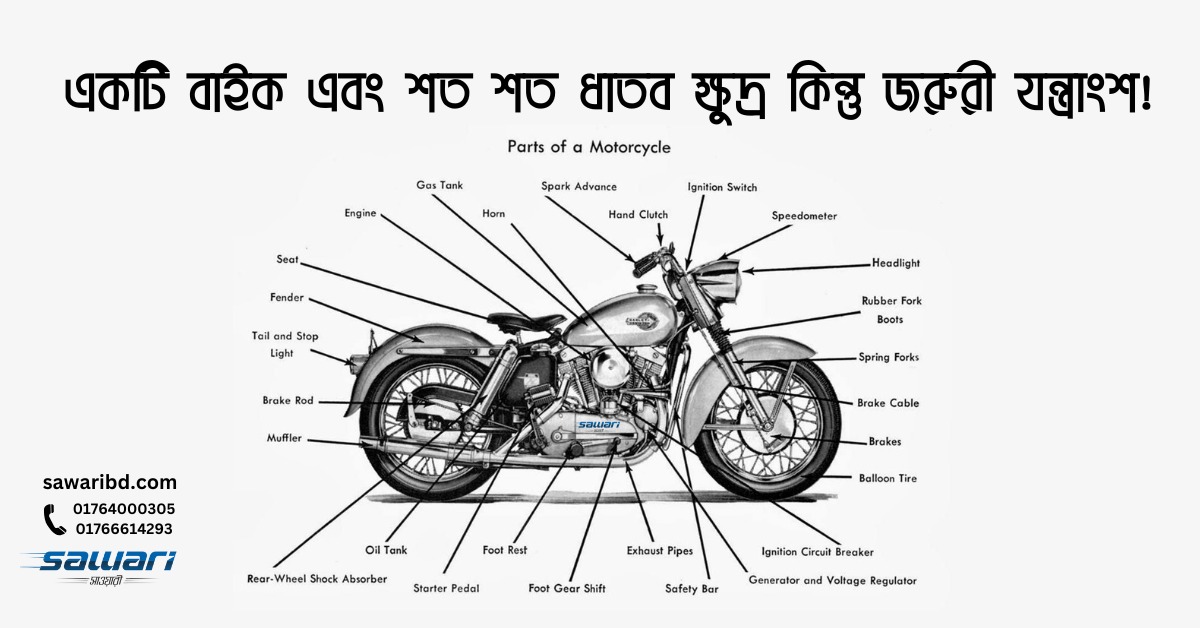FAQs Answered About Ordering Motorcycle Spares Christchurch Online
Discover the Important Motorcycle Parts You Required for Optimum Performance
Recognizing the vital parts of a bike is basic for attaining peak performance. Each component, from the engine to the stopping system, plays a critical duty in overall capability and safety. Routine maintenance can avoid unanticipated failings and improve the riding experience. Lots of motorcyclists overlook the details of these systems. Discovering how they function with each other can bring about a more effective adventure. What crucial parts should every biker prioritize?
The Engine: The Heart of Your Motorbike
The engine serves as the core component of a bike, driving its efficiency and defining its abilities. It is accountable for converting gas into mechanical energy, which powers the bike ahead. Different types of engines are utilized, including single-cylinder, V-twin, and inline configurations, each offering distinctive characteristics suited for different riding styles and purposes. The engine size, generally measured in cubic centimeters (cc), considerably affects efficiency, with bigger engines normally offering more power and torque.Furthermore, the engine's design and modern technology, such as fuel shot systems or air-cooling versus liquid-cooling, affect performance and dependability. Upkeep is crucial for peak operation; elements like routine oil modifications and monitoring ignition system assurance durability. Riders typically consider an engine's responsiveness and level of smoothness, as these attributes boost the overall riding experience. Ultimately, the engine remains an important element that specifies not only the motorcycle's efficiency however likewise the biker's connection to the machine.
The Transmission: Moving Gears Smoothly
The transmission plays an essential function in a motorbike's performance, especially in the technicians of equipment shifting. Understanding exactly how to move gears efficiently can boost the total riding experience, while normal maintenance warranties peak performance. Appropriate interest to these elements can considerably affect the long life and performance of the motorbike.

Equipment Shifting Mechanics
Smooth gear changing is essential for excellent motorcycle performance, significantly influencing both acceleration and control. The technicians of equipment shifting include the interaction between the clutch, equipment lever, and transmission system. When a biker engages the clutch, it disengages the engine from the transmission, enabling an equipment adjustment without damaging the parts. A well-timed release of the clutch, integrated with exact movement of the equipment bar, helps with a smooth modification in between equipments. This process guarantees that the engine runs within its finest power band, enhancing efficiency. Motorbike Components NZ. Additionally, recognizing the gear ratios and their effect on rate and torque can assist motorcyclists make educated selections throughout changes, ultimately contributing to a much more enjoyable and receptive riding experience
Maintenance Tips Value
Regular upkeep plays a vital function in ensuring that the transmission system operates successfully, enabling smooth equipment changes. Frequently checking and changing the transmission liquid is crucial, as old liquid can cause raised rubbing and wear. In addition, inspecting the clutch for wear guarantees peak engagement and disengagement, preventing slippage during equipment changes. Lubrication of moving parts is similarly crucial to minimize rubbing and improve efficiency. Motorbike owners must also keep track of for leakages and unusual sounds, as these can suggest underlying issues. By adhering to these upkeep ideas, cyclists can lengthen the life expectancy of their transmission system, ensuring that equipment changes remain smooth and adding to the general performance of their motorbike.
The Braking System: Ensuring Safety on Every Trip
Braking systems are essential elements that directly influence a motorcycle's security and performance. They contain numerous parts, including brake pads, blades, calipers, and hydraulic lines, all interacting to assure reliable slowdown. The sort of stopping system-- typically either disc or drum-- affects responsiveness and quiting power.Regular maintenance is important to copyright peak performance; used brake pads can bring about decreased effectiveness and enhanced quiting distances. Furthermore, the quality of brake liquid must be kept track of, as it can soak up wetness in time, endangering braking efficiency.Riders need to likewise consider the value of anti-lock braking systems (ABDOMINAL), which avoid wheel lockup throughout sudden quits, enhancing overall security. Properly operating brakes are not simply about quiting; they instill self-confidence in the motorcyclist, permitting much safer navigation through different terrains. Eventually, a dependable stopping system is critical for enjoying every trip with comfort.
The Suspension: Enhancing Comfort and Control
A well-functioning suspension system substantially adds to a motorcycle's general efficiency, complementing the performance of the braking system. The suspension plays a considerable duty in absorbing shocks from irregular surfaces, ensuring a smoother experience while preserving tire call with the roadway. This call is essential for both stability and control, permitting riders to navigate corners with self-confidence and precision.Different types of shock absorber, such as telescopic forks or mono-shocks, supply differing levels of convenience and handling. Appropriately tuned suspension boosts responsiveness, giving the biker with an extra linked feeling to the motorbike. Routine upkeep checks are crucial to ascertain the suspension parts, including springtimes and dampers, are working at their ideal. A reliable shock absorber not just elevates the riding experience however additionally adds to the longevity of various other motorbike parts by lessening damage. As an outcome, investing in quality suspension is crucial for any severe motorcycle lover.
The Tires: Connecting You to the Road
Tires play an important function in a motorcycle's performance, acting as the key link in between the roadway and the biker. Recognizing the different kinds of tires readily available can greatly affect managing and security. Furthermore, routine maintenance is crucial to guarantee peak tire performance and durability.
Tire Types Explained
How do various tire kinds affect a motorbike's efficiency? Tire types play an essential duty in identifying a motorcycle's stability, handling, and grasp. Sporting activity tires, developed for high efficiency, offer enhanced grip and responsiveness on smooth roads, making them excellent for racing and aggressive riding. On the other hand, exploring tires prioritize sturdiness and convenience, giving a smoother ride for long-distance traveling. Off-road tires, defined by their rugged tread patterns, master traction on unpaved surface areas, suitable for adventure lovers. Additionally, dual-sport tires blend characteristics from both off-road and on-road categories, catering to versatile riding requirements. Inevitably, selecting the appropriate tire type is important for maximizing performance, guaranteeing safety, and enhancing the general riding experience.
Upkeep Tips Offered
While riding when traveling, maintaining excellent tire condition is essential for safety and efficiency. Consistently examining tire stress is essential, as under-inflated tires can bring about bad handling and enhanced wear. It is recommended to examine step depth frequently; used tires concession hold and stability. Additionally, motorcyclists should search for indicators of damages, such as fractures or bulges, which can show the requirement for substitute. Turning tires periodically ensures also wear, boosting durability. In addition, keeping tires tidy from debris and avoiding excessive aesthetics can lengthen their lifespan. Maintaining appropriate placement and balance contributes to peak efficiency, lessening anxiety on other bike components. Following these maintenance pointers will significantly boost the general riding experience.
The Fuel System: Fueling Performance and Efficiency
The Homepage fuel system plays a vital duty in making best use of a motorbike's performance and effectiveness, as it guarantees the ideal shipment of fuel to the engine. It consists of a number of important parts, including the fuel tank, gas pump, fuel filter, and gas injectors or carburetor. Each component has to operate effectively to guarantee a smooth and powerful ride.The gas tank stores gas and supplies it to the engine via the gas pump, which generates the needed pressure. A fuel filter protects against contaminants from going into the engine, while the injectors or carburetor mix fuel with air for combustion.Proper upkeep of the fuel system is vital; a blocked filter or malfunctioning injector can result in reduced efficiency and boosted gas consumption. By verifying that the gas system operates effectively, motorcyclists can appreciate better throttle action, far better gas economic climate, and generally enhanced riding experience.
The Electric System: Powering Your Ride
An effective electric system is essential for the overall capability and safety of a motorbike, as it powers vital elements such as the ignition, lighting, and various electronic systems. This system consists of the battery, which stores energy, and the alternator, in charge of producing power while the engine runs. The wiring harness links these components, making certain reliable power distribution.Additionally, fuses protect the system from overloads, while relays aid manage high-current devices with low-power signals. A well-maintained electric system improves efficiency by guaranteeing smooth begins and consistent operation of signals and lights, vital for rider exposure and safety.Regular checks of the battery's charge and links are important for preventing electrical failings. Bikers ought to additionally evaluate wiring for wear and tear, ensuring all elements work ideally. Ultimately, a robust electric system contributes review significantly to the overall efficiency and integrity of the motorbike.
Often Asked Inquiries
How Commonly Should I Change My Motorcycle's Battery?
The frequency of motorcycle battery replacement relies on use and upkeep (Oem Parts New Zealand). Usually, batteries ought to be changed every three to 5 years. Regular checks can aid identify when a replacement is necessary for peak efficiency
What Tools Do I Required for Basic Motorbike Maintenance?
For basic motorbike upkeep, one requires vital tools such as an outlet set, wrenches, screwdrivers, pliers, tire pressure gauge, and a torque wrench. These tools help with reliable upkeep and ensure the motorbike runs efficiently and securely.
Exactly How Can I Enhance My Motorcycle's The rules of aerodynamics?
To improve bike aerodynamics, one need to consider readjusting fairings, making use of windscreen expansions, maximizing body setting, and decreasing overall weight. These modifications aid reduce drag, improving stability and fuel efficiency during adventures.
What Are the Indicators of a Failing Electrical System?
Signs of a falling short electrical system consist of lowering lights, trouble starting, irregular tool analyses, and blown fuses. Bike Parts Wellington. Unusual smells or rust around battery terminals may also show underlying concerns needing prompt attention for safety and performance

How Do I Choose the Right Oil for My Bike?
When selecting oil for a motorbike, one should consider the producer's specifications, thickness scores, and the sort of riding. Additionally, artificial versus traditional oil can influence efficiency and engine security, influencing the decision significantly. The engine dimension, normally gauged in cubic centimeters you could try here (cc), substantially affects efficiency, with bigger engines typically giving even more power and torque.Furthermore, the engine's design and innovation, such as fuel shot systems or air-cooling versus liquid-cooling, impact efficiency and integrity. A well-functioning suspension system considerably contributes to a motorbike's general efficiency, enhancing the effectiveness of the stopping system. The gas system plays an essential duty in optimizing a motorcycle's performance and performance, as it guarantees the optimum distribution of gas to the engine. A gas filter protects against impurities from going into the engine, while the injectors or carburetor mix fuel with air for combustion.Proper upkeep of the fuel system is crucial; a blocked filter or malfunctioning injector can lead to reduced efficiency and boosted fuel consumption. A properly maintained electric system improves performance by making certain smooth begins and regular operation of signals and lights, crucial for cyclist visibility and safety.Regular checks of the battery's cost and links are crucial for protecting against electric failures.